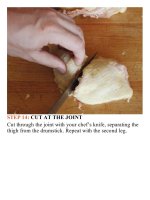The food lab better home cooking through science ( PDFDrive ) 410
Bạn đang xem bản rút gọn của tài liệu. Xem và tải ngay bản đầy đủ của tài liệu tại đây (116.82 KB, 2 trang )
GOINGAGAINSTTHEGRAIN
A
syouknow,meatismadeupofbundlesoflong
muscle fibers that are laid out parallel to one
another.Take a close look at your meat, and you’ll
see that, just like wood, it’s got a grain. In some
muscles,liketheloin(wherestripandrib-eyesteaks
come from) or tenderloin (aka fillet), that grain is
very fine: the muscle fiber bundles are thin enough
that they don’t form a significant grain. Cuts from
weak muscles like these will be soft and tender no
matterhowyouslice’em.Inexpensivecuts,likeskirt
steak, hanger steak (shown above), or flank, have
thicker muscle fiber bundles with a clearly defined
grain.
These fibers are tough cookies—they have to be.
Their job is to move the moving parts of an animal
that is much much bigger than you. Try to tear a
single muscle fiber by stretching it along its length,
and you’ll have a pretty hard time. But pulling
individual muscle fibers apart from one another is
relatively easy. So, before putting a piece of flank,
hanger,orskirtsteakinyourmouth,thegoalshould
betoshortenthosemusclefibersasmuchaspossible
with the help of a sharp knife. If you cut with your
knife parallel to the grain, you end up with long
muscle fibers that are tough for your teeth to tear
through. Slicing the meat thinly against the grain,
however, delivers very short pieces of muscle fiber
that are barely held together.Take a look below at
the difference between slicing with the grain (on the
left)andslicingagainstthegrain(ontheright):









